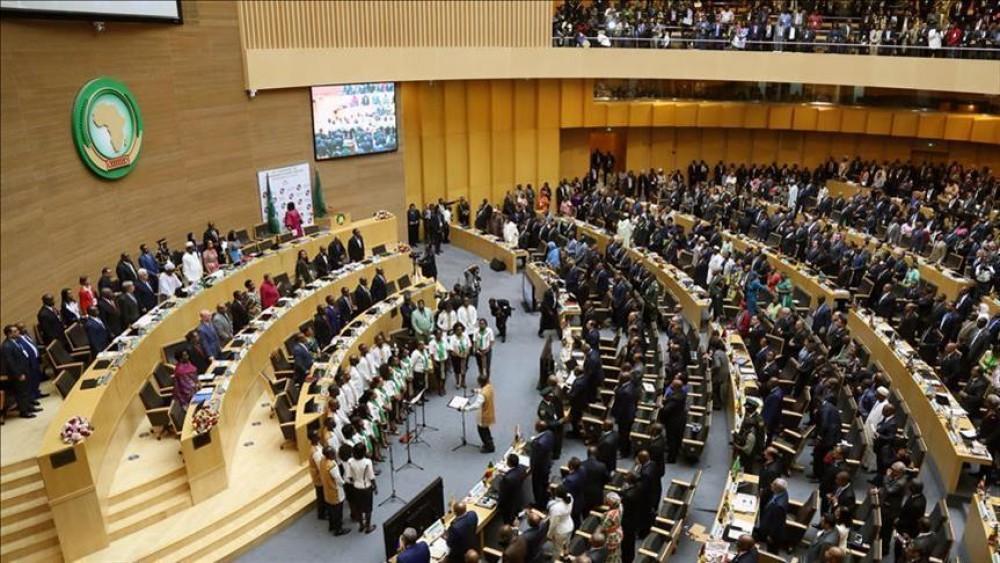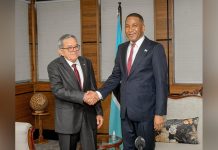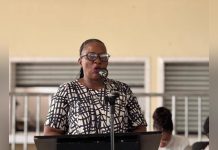Africa-Press – Botswana. The African Union is composed today of 55 Member States that extend through forests, deserts, plains and plateaus, rivers of great flow, continental countries and islands, a mass of compact land surrounded by the Atlantic and Indian Oceans, the Red Sea and the Mediterranean Sea.
The continental organization defends, like its predecessor OAU, the elimination of colonialism, the sovereignty of African States and economic integration, in addition to political and cultural cooperation on the continent. He has acted in the mediation and prevention of local conflicts. It has several bodies that regulate the functioning of entities and the relations between Member States, such as the Assembly, the Executive Council and the African Union Commission. Its headquarters are in Addis Ababa in Ethiopia.
It has an extension of 30,230,000 km2 and an estimated population of 1,407,175,342 people. Algeria is the largest country, the Seychelles the smallest, Nigeria the most populous with 216,763,677 inhabitants, and its highest point is Kilimanjaro (5895 m). Among the non-independent territories under Spanish administration are Las Palmas de Gran Canaria and Santa Cruz de Tenerife, Ceuta, Melilla. The islands of Mayotte and Réunion belong to France. The island of Saint Helena belongs to the United Kingdom, off Angola.
Despite its enormous human and natural potential, Africa continues to face devastating social, political and economic crises. Malnutrition in children up to 5 years of age and in pregnant women is frightening. Hunger and disease are endemic, 60 years after the proclamation of modern national independence.
The challenges for the 21st century are many, including reducing poverty and social exclusion, building nations and collective security, launching global policies for inclusive and integrated development in the social, political, economic and institutional areas. In addition, care must be taken to ensure democratic governance and transparent management, as well as tolerance and acceptance of diversity and scrupulous respect for human rights, strengthening the role of women and building solid institutions.
Africa 2022 is not a continent at peace, let alone a continent reconciled with itself. Wounds open everywhere in regional conflicts, in coups d’état, in extremist Islamic threats.
Ethiopia
Since November 2020, conflicts have been taking place in the Tigray region between the government and an independence movement, led by a local liberation front. Ethiopia also has territorial disputes with Sudan in the al-Fashqa region.
In addition, there is political tension with Egypt over the construction of an Ethiopian hydroelectric dam on the Nile River, on Ethiopian territory, close to the Sudanese border. The production of energy at the hydroelectric plant started in February 2022. Egypt and Sudan fear that a water crisis will occur because of the dam built by Ethiopia. The two countries did joint military exercises in the year 2021. These war exercises were called Operation Guardians of the Nile.
Somalia And Kenya
Since 2014, Somalia and Kenya have discussed sovereignty and a new border division between the two countries in a fishing region on the Indian Ocean coast, where oil and natural gas also exist.
The conflict is also exacerbated because Kenya supported the independence movement of the Jubaland state in Somalia. In the month of January, nine people died due to conflicts between separatist militias and army troops in the region.
Burkina Faso
In January, the Patriotic Movement for Safeguarding and Restoration (MPSR) of military leader Paul-Henri Sandaogo Damiba took control of Burkina Faso by overthrowing the government of President Roch Kaboré, which had been in power since December 2015. 50 soldiers have been killed in the last four months during clashes with extremist groups in various regions of the country.
Mali
On 3 December last year, an attack by an armed group on a bus killed 31 people in the city of Mopti. The terrorist attack was a response to the Government’s attempts to contain an attempted military coup promoted by extremist groups.
In ten years, between 2012 and 2022, Mali went through three coups d’état. The conflicts between militias in the north of the country extend to regions in Niger and Burkina Faso.
Burundi
A country in southern Rwanda, Burundi has been through a civil war for the past two years. Internal conflicts eased in June last year, when military leader Evariste Ndayishimiye was elected President. The pandemic and the increase in hunger provoked the resumption of conflicts between extremist groups.
DRC
The Democratic Republic of Congo (DRC) has more than 200 ethnic groups vying for territories, natural resources (rich in diamonds, copper, cobalt, gold and niobium) and political power. The 1998-2003 war left around 4 million dead. It was the conflict that had the highest number of victims after World War II and involved the involvement of 11 African countries and dozens of armed groups.
The peace agreement promoted by the international community was signed in 2002, putting an end to the bloodiest conflict ever seen on the continent. The agreement required 30,000 Rwandan soldiers to withdraw from the DRC, as well as the arrest of Hutus who had participated in the genocide in Rwanda but fled to the neighboring country.
The DRC is still in the midst of a serious humanitarian crisis and atrocities committed by armed groups in the search for the appropriation of natural resources. According to the UN High Commissioner for Refugees (UNHCR), there are around 900,000 Congolese refugees in African countries and around 5 million internally displaced people.
According to the Global Center for the Responsibility to Protect, in 2021 the UN Security Council declared that around 31 individuals and 13 entities are subject to sanctions.
Sahel Region
From the West Coast, with Senegal and Mauritania, to the East Coast, with Sudan and Eritrea, the Sahel is a transitional, semi-arid region, between the Sahara and the savannas, to the south. It divides the continent in two, Islamic Africa to the north and Christian Africa to the south. It encompasses 11 countries and dozens of ethnic groups.
The region is the center of activity and expansion of criminal and terrorist organizations. After Mali’s independence in 1960, tensions broke out between the Mande peoples to the south and the Tuareg peoples to the north. The Tuaregs are fighting for their territory in Mali, Azawad and other sources of instability have emerged in alliance with Gaddafi’s Libya and Ansar Dine, an Islamist group allegedly linked to AQIM (al-Qaeda in the Islamic Maghreb).
After the fall of Gaddafi, in 2011, and with the action of terrorist groups, the political and military organization MNLA (National Movement for the Liberation of Azawad) was created, formed mostly by Tuaregs. In 2011, the MNLA revolted against the Government and with other groups, such as Ansar Dine, unleashed a civil war without conclusion to this day.
With two coups, in 2012 and 2020, terrorist groups and a civil war, Mali appears to be a failed state. In April 2013, MINUSMA (United Nations Integrated Multidimensional Mission for the Stabilization of Mali) was created, which also aims to protect civilians and monitor human rights.
In mid-2021, MINUSMA stated that it had documented 422 human rights violations, including 241 abuses, 39 summary or arbitrary extrajudicial executions. 51 torture or ill-treatment and 118, in addition to cases of massive and forced displacement of civilians, death threats and intimidation, looting and destruction of property. According to UNHCR, there are a total of 1,340,263 IDPs in the region.
The International Criminal Court sentenced former Ansar Dine leader Ahmad al-Faqi al-Mahdi in 2017 for the destruction of a world heritage site in Timbuktu, classified as a war crime. The UN Security Council also acted by imposing sanctions on eight individuals in Mali for human rights violations, including the recruitment of child soldiers and attacks on UN members.
Gulf Of Guinea
Since 1990, the action of pirates has been a reality on the East African coast, especially in the area known as the Horn of Africa. Piracy has also grown on the West Coast of the continent, mainly in the Gulf of Guinea, putting at risk important international maritime routes and the transport of oil in the region, threatening security and peace in the South Atlantic.
The energy potential of the Gulf of Guinea countries is enormous. More than 5.4 million barrels of crude oil per day are produced in this area, which accumulates reserves of more than 50.4 billion barrels, most of which have low sulfur content and are off-shore. Among the largest producers in the region, Nigeria and Angola stand out, in addition to emerging producers, such as Congo Brazzaville, Cameroon and Gabon, and new producers, especially Equatorial Guinea.
The Gulf of Guinea also has great potential for the production of natural gas. This is combined with its privileged geographical position halfway between Europe and America. Created in 2001 in the capital of Gabon, Libreville, the Gulf of Guinea Commission began activities in 2007, with eight member states.
The Commission’s objective is to facilitate regional consultations to prevent, manage and resolve conflicts that may arise from the delimitation of maritime borders and the economic and commercial exploitation of natural resources within the borders of African countries and also the fight against piracy.
Cabo Delgado
A natural gas-rich northern province of Mozambique, Cabo Delgado has faced attacks by armed groups since October 2017. Islamic terrorism has already claimed the lives of many hundreds of people and nearly a million displaced people.
The villages of Mocímboa da Praia and Quissanga were invaded by the terrorists, who destroyed infrastructure and hoisted their flag in an Armed Forces barracks. They intend to impose Islamic law in the region. International troops have been sent to the region to help the Mozambican military face the threat that has been destabilizing the country.
Despite the tendency of populations to return to their areas of origin, many villages are still deserted and or were destroyed by the rebels. Last year, Angola sent 20 military personnel and an aircraft to Cabo Delgado, as part of the Southern African Development Community (SADC) Mission to support the Mozambican Armed Forces against terrorism in the north of the country.
Angola’s Role In Conflict Mediation
After two devastating wars, Angola has known, for 20 years, a situation of effective peace, with the structure of the former armed opposition, UNITA, having been called to integrate into political, social and economic life country, becoming the second political force.
In three months, the country will have general elections, aimed at deepening multiparty democracy. Angola has played an important role in mediating conflicts and facilitating understandings, not only in the Great Lakes Region, where it holds the presidency of the Conference, but also in the Gulf of Guinea.
The destabilization in the gigantic neighbor Democratic Congo is also a relevant part of the concerns of the Angolan Government and society.
The search for integration into SADC and Central Africa occupies a prominent place in Angolan diplomacy, which also holds the presidency of the Community of Portuguese-Speaking Countries (CPLP).
Africans’ Appeal To The IMF
The Covid-19 pandemic and the current Russo-Ukrainian war are causing new economic problems for African countries. Once again, Africans are preparing to turn to the International Monetary Fund, through the Rapid Financing Instrument, with a line dedicated to countries that have been affected by Covid-19.
South Africa is the country most affected by the pandemic and is responsible for more than half of the cases on the continent. The IMF recently announced the loan of US$4.3 billion.
Nigeria, which had been on a very unstable path of economic growth, borrowed around US$3.4 billion. Angola took out a loan of around US$4.5 billion. In total, loans from the continent’s countries to the IMF reached 26 billion, with the expectation of new requests and renegotiations.
Some experts, however, estimate that it will take around 1.3 billion to get African economies back on their feet. The crisis will delay the launch of the African Continental Free Trade Area (ZLEC), an African Union initiative involving 55 countries.
For More News And Analysis About Botswana Follow Africa-Press






